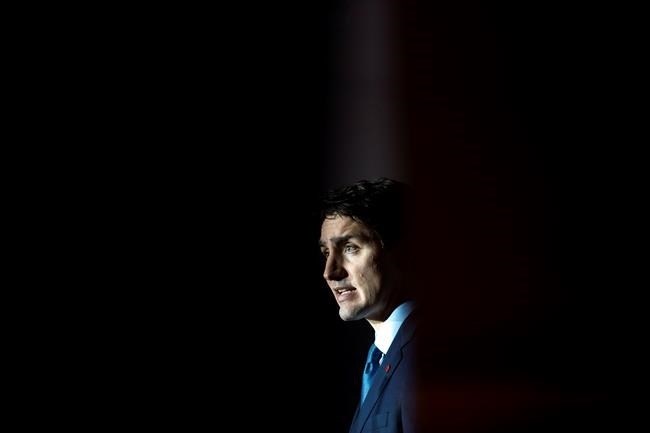
Prime Minister Justin Trudeau was in China most of the week, where the public pressure for Canada to launch free-trade talks - mainly as an antidote to Trump's penchant for protectionism and faltering NAFTA negotiations - escalated even as the preliminary discussions stalled in a conflict of competing visions. Prime Minister Justin Trudeau holds a press conference in Guangzhou, China, on Thursday, Dec. 7, 2017.
Image Credit: THE CANADIAN PRESS/Sean Kilpatrick
December 09, 2017 - 9:00 PM
OTTAWA - Official Ottawa spent the week absorbing the aftershocks of aggressive Donald Trump foreign policy decisions.
On trade: Prime Minister Justin Trudeau was in China most of the week, where the public pressure for Canada to launch free-trade talks — mainly as an antidote to Trump's penchant for protectionism and faltering NAFTA negotiations — escalated even as the preliminary discussions stalled in a conflict of competing visions.
On the Middle East: The U.S. president's decision to move the American embassy in Tel Aviv to Jerusalem forced ally after ally to re-declare or redefine where it stands on the best route to peace in the Middle East, and Canada was no exception. Urged by some to stand with Trump, and by others to stand up to him, the federal government steered a careful, precarious path in favour of the status quo.
And on lumber: On Thursday, American trade authorities sided with the U.S. softwood lumber lobby, and voted to entrench astronomical duties on Canadian lumber exports — prompting the federal government to declare it would fight the fees tooth and nail.
Even as the week demonstrated the price Canada is paying for Trump's disruptions, it was also notable for some domestic developments — on legalizing cannabis, on conditions on First Nations reserves and on defence.
Here are three ways politics touched Canadians this week:
DRUGGED DRIVING
Governments at both the provincial and federal levels are ramping up their preparations ahead of the legalization of cannabis set for next year. As provinces roll out details for the how, the where and the who-may-buy, the federal government is wrestling with how to deal with dramatic changes required in policing, retailing and in the way society views the long-illegal substance.
With pressure mounting to educate the public, on Tuesday, Public Safety Minister Ralph Goodale launched a $3-million series of ads meant to warn drivers about the risks of driving while high. The ads target young people, especially since polling suggests that about half of them believe it's more acceptable to drive under the influence of cannabis than while drunk.
Drug-impaired driving is already on the rise, according to research by Public Safety Canada.
Provinces and other stakeholders say public education is the least Ottawa could do. Provincial finance ministers are coming to Ottawa on Sunday and Monday in part to squeeze Ottawa to allocate them a larger share of tax revenue than the 50 per cent the federal government has been eyeing — especially since the provinces feel they are shouldering most of the burden of implementing legalization. Federal sources say they're open to a bigger number, but they haven't revealed yet how far they'll go.
CLEAN DRINKING WATER
If the Liberals thought keeping their election promise to legalize marijuana was hard, the commitment to ensure clean drinking water on reserves is in a realm of its own.
So far, the federal government's efforts have meant that the number of long-term advisories on systems supported by the Department of Indigenous Affairs has barely budged, dropping to 70 from 77. And now, the parliamentary budget officer says the feds haven't set aside enough money to realistically end boil water advisories as promised.
The budget officer figures the federal government will need to spend at least $3.2 billion on water and waste water systems on reserves if the goal is to put those systems on par with the rest of the country within five years. So far, the federal government has earmarked $2 billion for the effort.
BUCKETS OF BOLTS?
It looks like the Royal Canadian Air Force is about to go vintage. After years of high-pitched political battles over how to replace Canada's fleet of fighter jets, the federal government is poised to buy a batch of used Australian jets to tide it over until it figures out how to buy new.
The Conservatives have accused the Liberals of wanting to spend billions on a "bucket of bolts" — 30-year-old planes that will need major upgrades to continue flying into the next decade. Kind of like the existing fleet that Canada is replacing.
But the Liberals have eliminated other options. During the election campaign two years ago, they said they would not buy F-35s from Lockheed Martin, as the previous Conservative government had planned. And just recently, they threatened to ditch their $6-billion expression of interest in buying Super Hornets from Boeing because the U.S. company was waging a vicious trade war against Canadian favourite Bombardier Inc.
The saga means that the big purchase of permanent replacements for Canada's F-18s will most likely be delayed once again, with deliveries to start around 2026 instead of 2021. Costs will undoubtedly be higher, the longer they wait.
But as one expert said, Canada has developed quite an expertise in dealing with antiquated jets.
News from © The Canadian Press, 2017